Chairperson of Technical working group on Gender Based Violence including Femicide Nancy Barasa during a stakeholder engagement at KICC , Nairobi on April 9th 2025. [Collins Oduor,Standard]
×
The Standard e-Paper
Kenya’s Boldest Voice







